
(Most recent first. Click on the titles for fuller descriptions).
1st December 2020
With an area of almost 1.4 million square miles (five times that of France), the South China Sea is not only a large body of water but also, because of its location (bounded by China, Taiwan, the Philippines, Indonesia, Brunei, Malaysia and Vietnam) it has huge economic and strategic importance. At this talk (by video conferencing) Club member Ron Enock gave a fascinating and somewhat worrying account of the activities of China in recent years. He described how that country has attempted to extend its territorial claims over those of its neighbours by laying claim to, and developing, several islands in the Paracel and Spratley archipelagos, most of which lie beyond China’s recognized territorial seas.
To give an idea of the international significance of the South China Sea, the speaker explained that it is used by one third of the world’s maritime shipping, of which a significant proportion represents the majority of China’s trade. As well as its importance to shipping, the sea is rich in resources such as fishing and, below the sea bed, proven reserves of oil and natural gas.
Drawing on knowledge and experience gained during his former naval career at a senior level, Ron explained the history behind the current situation and outlined the role played by International Admiralty Law. In 1958 China laid claim to the South China Sea islands but its neighbours, basing their claims on the subsequently enacted United Nations Convention on the Law of the Sea (UNCLOS) similarly claimed their own maritime zones, many of which resulted in overlapping areas. These disputes have been further complicated by disagreements over the definition of what constitutes “an island” within the legal scope of UNCLOS. Ignoring a ruling against it by the Permanent Court of Arbitration, China has pursued a policy of power projection in an attempt to bolster its legal claim to sovereignty over its claimed territory by constructing artificial islands (and, in the process, causing enormous damage to the local environment).
Chinese troops and military facilities (including airstrips) have been observed on many of these islands and the exact reasons for their construction remain a matter of debate. However, in view of China’s increasing assertiveness towards much of the rest of the world, its motives should continue to be regarded with utmost care.
17th November 2020
Do our schools provide students with the knowledge and skills that are needed by industry and the economy of this country? This was the question asked by Club member, Jeff Marsh, at this Zoom meeting. Before offering his own views, and inviting contributions to the debate from his fellow members, Jeff – a retired secondary school teacher – outlined the history and development of our present education system.
As he described, until the latter part of the nineteenth century the limited amount of schooling that was available was carried out in long-established private institutions or by social groups, often funded by one or other of the various religious denominations. Then, in 1870, Parliament passed the Elementary Education Act which set the framework for schooling all children between the ages of 5 and 12. It gave powers to local authorities to establish school boards which were to administer elementary schools. Thus was established the principle of compulsory education for all. Following proposals developed by leading specialists during the 1920s and 1930s, the next major change came with the 1944 Education Act, the most important effect of which was to ensure free secondary education for all. This was especially beneficial for girls and for working class children of both sexes.
From time to time, further reforms have attempted to address the shortcomings that have arisen in the system, especially in respect of the school curriculum and whether it is fit for purpose. There has been much criticism from industry that schools have been out of touch with industry’s needs. However, from their perspective, schools have claimed that industry has not made its requirements clear. Successive governments have made changes to the system, no doubt all of them well-intentioned but often disruptive and difficult to put into practice.
Against this background, the speaker returned to his initial question and, knowing that most of his audience had been employers of one sort or another, he sought their views and their experiences. This prompted an enthusiastic debate in which many expressed concern that too much emphasis has been placed on the value of academic education to the detriment of the more technically-oriented subjects. It was agreed that, within society generally, there needs to be better appreciation of the importance of the latter.
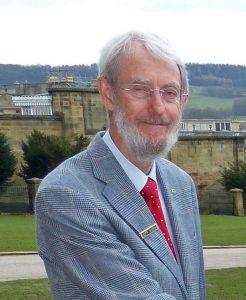
Jeff Marsh
3rd November 2020
Departing from the usual format of our meetings, in which a single speaker gives a presentation on a (usually serious) topic, today we held a light-hearted quiz, using video conferencing. Three of our members, Ian Johnston, Steve Marsh and Peter Donaldson devised a series of visual clues with which to challenge the problem-solving capabilities of the other members of the club.
The first part of the quiz was based on a variation (using pictures instead of words) of the television programme ‘Only Connect’. It comprised twelve groups of pictures with four pictures in each group. The contestants, in teams of five people, were tasked with identifying the pictures in each group and, hence, establish the connection between the four. To solve all twelve groups required a knowledge of subjects as diverse as geography, sport, music, literature, and commonplace objects.
The other three parts of the quiz were also visual. One of them showed a series of political cartoons and other pictures about current affairs, and required the teams of contestants to identify the events depicted. In a similar vein, for a third group of questions, for each question the teams were shown a quotation and pictures of five people. From these clues, they were to match the quotation to the person who had said it.
Finally, the contestants were given a series of famous logos in which two versions (one true and the other false) were shown side-by-side. For each example, the true version had to be identified. Even though the logos were for everyday products, it proved no easy task to say with certainty which logo was the correct one, thus demonstrating how unobservant people can be.
After a keenly fought and enjoyable contest (which was won by a team led by David Webb), the participants agreed that they had been provided with some much-needed light relief in these rather gloomy days of early winter.
20th October 2020
Once known as the workshop of the World, this country has, for decades, seen a continuing loss of its manufacturing capabilities to foreign competitors whose labour costs and workplace conditions have often been significantly lower than those demanded in Britain. Overseas manufacturers have also benefitted from higher levels of investment in equipment, and closer attention to working processes which have resulted in products that are not only cheaper but, in many cases, of superior quality to those made in Britain.
It was at this, our Annual General Meeting (at which the chairmanship was handed over from Tony Byrne to Malcolm Cameron), that club member Bernard Webster related the story of one business which, from small beginnings in the early nineteenth century, developed into one of the largest employers in Leicestershire, only to overreach itself in its acquisition of other businesses and thereby leave itself open to the hostile pressures of the global economy.
The speaker described how Nathaniel Corah set up his own business in the hosiery trade at the end of the Napoleonic Wars and, throughout the following decade expanded his operations from his original base in Leicester to Birmingham. By the time of Nathaniel’s death at the age of 55 in 1832, his sons had taken over the company and they continued to develop it by opening warehouses for their products in most of the major Northern cities, and in Cardiff. Using the trade name ‘St Margaret’, Corah’s clothing was supplied to Marks and Spencer through much of the twentieth century.
Recognized as an altruistic employer, Corah took the unusual step of giving its employees one week paid annual holiday from as early as 1890 and provided many other benefits to its workers. However, it suffered during both World Wars from loss of staff to the war effort, and was badly affected by the Great Depression of 1926. In the 1970s, a severe shortage of local labour willing to become sewing machinists was overcome by employing Asians expelled from Uganda by its despotic president, Idi Amin.
The recessions of the 1970s and 1980s, combined with changing tastes in fashion and foreign competition left Corah in a weak position which resulted in a takeover by an Australian corporate raider, Charterhall plc, which proceeded to break up the business and, in effect, run it into the ground. The final blow came in 1990 when the once-great factory in Leicester was closed.
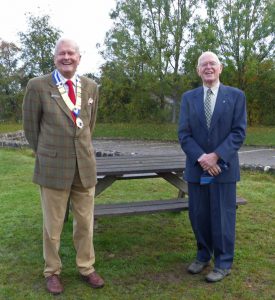
Malcolm Cameron and Tony Byrne
6th October 2020
Bankers and banking! After the 2008 financial crisis and its repercussions, these words became associated with greed, incompetence and fraud but, by this time, the whole nature of banking had changed from the staid and generally well-respected image which the banks and their employees had presented for generations. It was this earlier period that was the subject of this talk by club member Malcolm Cameron who had spent a career in banking which had ended with his retirement well before the events of 2008 took place.
In an entertaining talk full of anecdotes about the many people whom he had known as work colleagues or clients, the speaker described how, almost by accident, he had entered a profession that was to provide him with a career for the whole of his working life, culminating in a senior position in the NatWest bank.
On leaving school, Malcolm’s intention had been to pursue a career based on his interest in chemistry. Accordingly, he applied for a job with Boots in Nottingham but, even while waiting for a response to this application, his father had been speaking to the local bank manager who suggested that Malcolm should consider banking, initially for a probationary six-month trial period. The outcome was satisfactory for all concerned and so, in August 1959, Malcolm’s career was launched, albeit at a very junior level.
The speaker then described how his career progressed, from being a clerk, through increasingly responsible promotions, each of which seemed to involve a move from location to location, starting in his home town of Belper, successively to Derby, Sheffield, Nottingham, Hull and, finally, Birmingham. During this time, the Westminster Bank, his original employer, merged with the National Provincial to create the ‘National Westminster’ (NatWest) in 1970. This was simply the latest of many mergers and take-overs in the history of the Westminster. Indeed, J. Taylor & Sons, a company local to Bakewell itself, and which had been founded in 1846, was merged into the Westminster in 1879.
Malcolm’s career saw many changes in banking, including the introduction of credit cards and computerisation, developments that were almost revolutionary at the time, but which are now taken for granted, of course. However, as he was happy to report, he played no part in the hazardous investment side of banking which led to such disastrous results a dozen years ago.
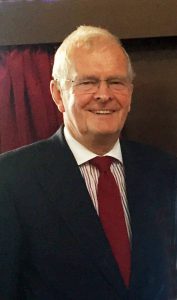
Malcolm Cameron
15th September 2020
August 15th this year marked the 75th anniversary of VJ Day which, with the surrender of Japan in 1945, brought the Second World War to a close. It was appropriate, therefore, at this time of commemoration that the subject of this talk (given by video conferencing) should be Orde Wingate, the founder and leader of the Chindits in Burma during that conflict. The speaker on this occasion was our Speaker Coordinator, Peter Holt, who described the life and achievements of this often controversial man.
Orde Wingate was born into a military family in 1903, one of seven children whose upbringing was strict and, at home, isolated from other children apart from their own siblings. As early as Wingate’s school years, he started to display a self-confident, individualistic and competitive character but one that was lacking in social skills to the extent that verged on eccentricity. Gaining an army commission in 1923 his first overseas posting, from 1928 until 1933, was to Sudan which, at the time, was under British control. Here he became fluent in Arabic and gained experience in leadership and the ability to survive under hostile conditions.
After a short period back in England, he was again sent abroad, this time to Palestine where Britain had a mandate to govern the fledgling Jewish National Homeland. It was here that Wingate led a force, the Special Night Squads, whose members were extremely fit and operated in secret, at night, and with detailed knowledge of the local terrain. These were the sort of tactics that formed the basis of Wingate’s subsequent activities, first in Sudan against Mussolini’s occupying troops and then in Burma when, in 1942, after the Japanese invasion, he was invited to join the staff of General Wavell (Commander in Chief, India) with the brief to develop a strategy for fighting back against the invading army.
The speaker continued by describing the methods by which Wingate developed his ideas which were based on long range penetration behind enemy lines in Burma, with the aim to create chaos by attacking communication and supply lines. Thus was born the 77th Indian Brigade, known as the Chindits. They carried out two notable operations, ‘Longcloth’ in 1943 and ‘Thursday’ in 1944, both of which succeeded in their objectives but at great cost in terms of Allied casualties, especially in the case of the former. As well as the high numbers killed, many of the survivors were traumatised by their experience of jungle warfare. Shortly after operation ‘Thursday’ began, Wingate was killed in an aircraft accident. His Chindit operations pricked the “Super Jap” bubble and diverted Japanese attention and resources away from the main focus of their campaign in Burma. Wingate was an inspiring leader and a maverick genius. His continuing legacy was demonstrated in 2015 when a “new” 77th Brigade was formed by the British Army (with a familiar Chindit logo) to operate clandestinely in the secretive world of cyber warfare.
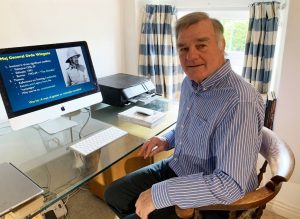
Peter Holt
1st September 2020
With the controversial handling of examination results and the process of safely re-opening schools, the well-being of our children has been much in the news of late. It was therefore topical for us to hear this talk (by video conferencing), given by club member David Webb on the subject of one particular group of children – those in residential care.
Formerly a Pro Vice-Chancellor of Nottingham Trent University, the speaker’s career in sociology had been influenced in particular by two people of very different backgrounds, his great aunt, Eva Somerwell, and the Italian Marxist thinker, Antonio Gramsci.
Eva Somerwell was the matron of a children’s home, St Gabriel’s, for girls in Brighton during the 1950s and was visited by her great nephew on many occasions before her retirement in 1959 and death in 1985. St Gabriel’s was one of numerous homes run by the Church of England Children’s Society (now simply ‘The Children’s Society’) whose origins can be traced back to Edward Rudolf, a devout Sunday school teacher who had been appalled to find children begging on the streets of Victorian London. A photograph shown by the speaker provided evidence of a group of clearly happy and well cared-for girls at St Gabriel’s. However, this was the 1950s – before the social upheavals of the permissive 1960s and 1970s which, in David’s view, had resulted in an atmosphere of leniency that created so many opportunities for the exploitation and ‘grooming’ of children in care. We are clearly still living with the after-effects of this lack of structure in these unfortunate children’s lives.
The second of the speaker’s subjects, Antonio Gramsci (1891-1937) was a writer and politician who, during a period of imprisonment by Mussolini’s Fascist regime, developed his theory of cultural hegemony. This, according to Marxist philosophy, is the domination of a culturally diverse society by the ruling classes who manipulate the culture of that society such that this ruling-class view becomes the accepted norm. As has been shown by such movements as Me Too and Black Lives Matter, it can be uncomfortable and difficult for society to recognize the injustices created by entrenched ‘accepted’ attitudes.
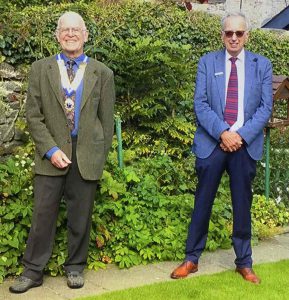
Tony Byrne and David Webb
18th August 2020
It has become a convention of this Club that, as soon as practicable after joining, a new member is asked to talk to his fellow members on a subject of his own choosing, provided that he avoids potentially contentious topics such as party politics or extreme religious views. As a way of introducing themselves to the Club, many new members opt to talk about themselves and their careers. Talks such as these are especially popular with their Club colleagues as demonstrated at a recent (video conferencing) meeting when Paul Davies, who joined earlier this year related the story of his career.
After graduating with a degree in mathematics, Paul joined the Ford Motor Company in 1979 where he received training in quality management. At the time, the Japanese car makers, with their meticulous attention to the quality of their products, were making serious inroads into the European and American markets. In response, manufacturers like Ford had to adopt the Japanese methods of thinking and working. It was in this atmosphere of change that Paul developed his skills in quality management. These served him in good stead when, after seven years, he left Ford and joined the international firm of management consultants, PA Consulting Group whose clients included major operators such as Rover Cars, BT and British Airways.
A few years later, looking for a more satisfying way of earning his living by working for himself rather than as an employee, Paul joined four colleagues in their own consultancy business which successfully grew to an annual turnover of £4 million. However, in time, he felt the need to stand back from the pressures of work and he became involved in an organisation, Bizfizz, which supports start-up businesses and encourages small-scale entrepreneurs by giving management advice. Although semi-retired, Paul now helps to run Clowne Enterprise which provides this sort of free or low-cost help to local businesses and new start-ups. No doubt, in the present economic climate, such services will be increasingly in demand as the country attempts to recover from the Covid-19 pandemic.
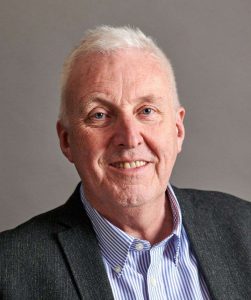 Paul Davies
Paul Davies
4th August 2020
Few people who have been fortunate enough to see elephants in their natural habitat in Africa can fail to be impressed by these remarkable animals. At this meeting (by video conferencing), his enthusiasm and fascination for this subject was explained by the speaker, Club member, Richard Chaplin. Illustrating his presentation with photographs taken during his many trips to East and southern Africa, Richard described the evolution, physiology and behaviour of the two species of elephant, African (Loxodonta Africana) and Asian (Elephus maximus), but with particular emphasis on the former (whose Latin name refers to the lozenge-shaped indentations in its molar teeth).
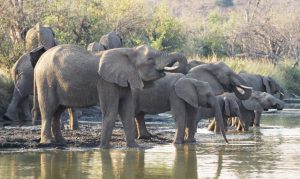
Evolving about six million years ago from a source common to the two species of elephant and mammoths, the African group further evolved into two subspecies, Savanna and Forest which, as their names indicate, are generally found in different environments. Each type has distinct features but interbreeding occurs where their ranges overlap. Standing four metres tall at the shoulder and weighing up to seven tonnes, the males are notably bigger than the females. Both sexes can live up to 60 or 70 years and, in addition to their well-known ‘trumpeting’, can communicate by means of a very low frequency rumble that can carry for a distance of 20 km. Apart from the massive tusks, an elephant’s trunk is probably the most unusual feature of the animal in that it is, in many ways, more versatile than the human hand.
The speaker continued by describing the animals’ diet which is a varied mix of vegetable matter ranging from grass and leaves to roots, sticks and even whole branches. As for their relationship with each other, their society is matriarchal and particularly protective of their young. They are generally tolerant of the presence of humans though will invariably assert their dominance; they seldom tolerate predators and will seek to displace them; in any event if they feel threatened they can charge, usually in a mock display, but a full charge is terrifying and can have severe outcomes.
This was a most enjoyable and informative talk which resulted in a lengthy discussion among Club members afterwards.
As a final thought, human activity, including the continuing illegal trade in ivory, has resulted in the population of African elephants falling from about 10 million in 1900 to 350,000 in little more than a century. Is it not a shameful reflection on humankind that we are responsible for such a drastic decline in the numbers of these magnificent animals?
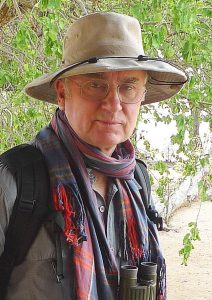
Richard Chaplin
21st July 2020
Although females represent one half of the total human population, they remain significantly under-represented in many walks of life, especially in the professions and senior positions in industry, academia and other bastions of male dominance. All too slowly, this state of affairs is changing but, even so, it is better than it was in the late-Victorian and Edwardian era around the start of the 20th century. The story of two remarkable women living at this time was told to us (using video conferencing) by one of our longest-serving members, Alan Grant.
The first of Alan’s subjects was Cecilia Payne (born in 1900) who proved to be a very talented student but was frustrated by the paucity of maths and science teaching offered to the girls at her first senior school. Hence, in 1918, she changed schools for St Paul’s School for Girls where, despite receiving encouragement to follow a career in music, she preferred to concentrate on science, and won a scholarship to Newnham College in Cambridge. Initially, her interests lay in the field of general science but, having heard a lecture by the astronomer, Arthur Eddington, Cecilia was inspired to follow this particular branch of science. At that time, prejudice against high-achieving women was so strong in England that she left the country in 1923 to take up a position at the Harvard College Observatory. Here, in the more enlightened atmosphere of America, she flourished and became the first astronomer to prove that hydrogen is the most abundant element in the universe, a fact fundamental to the understanding of many aspects of astronomical study. In spite of her achievements, it was to be many years before the all-pervading prejudices against women were overcome and she was given the recognition which she deserved.
Alan’s second subject was Louisa Garrett Anderson (born in 1873) who followed her mother into the medical profession and was a suffragette. Attitudes at the time were such that there was much opposition to the idea of female doctors treating male patients. Consequently, Louisa, with her partner Flora Murray (who was also a doctor), joined the New Hospital for Women in London. On the outbreak of World War I, the two women founded the Women’s Hospital Corps and set up a hospital in Paris to treat injured soldiers from the Western Front. At a later stage in the war, they set up and ran a military hospital in London for the same purpose. Thousands of men were treated here until, in 1919, the facility was closed by the government and all the staff were de-mobbed. Like so many women who had contributed to the war effort in many fields, Louisa and Flora were cast aside; the attitude of the day being that they had served their purpose and could now be dispensed with.
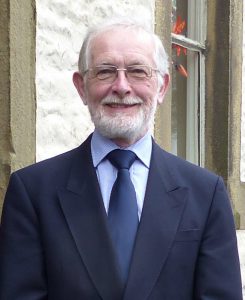
Alan Grant
7th July 2020
For this now-customary annual event (but, this year, using video conferencing), we chose for our 2020 debate the proposition that ‘Our current House of Lords is unfit for the 21st century’. Leading the discussions were John Robinson who supported the proposition and Jonathan Wicksteed who opposed it, with Club Chairman Tony Byrne overseeing the proceedings.
In his opening arguments, John Robinson gave a brief history of how the British system of government has evolved over the centuries such that the elected House of Commons now has supremacy over the House of Lords. This has the effect that the latter’s role is mainly advisory, being limited to the scrutiny and revision of parliamentary bills originating in the lower house. In this respect, the Lords provide an essential service in moderating any excesses of government. However, as the speaker asserted, the House of Lords is undemocratic in that its members are appointed rather than elected. In its make-up it is unrepresentative of the population – for example, 73% of its members are male, compared with only 27% female. It is too large, and has too many members who contribute little in return for the attendance fees which they claim. And, it is seen as a repository of political allies of whichever shade of government happens to be in power at the time.
Responding to his opponent, Jonathan Wicksteed opened by questioning whether the House of Lords is indeed ‘unfit’ in the sense of being not of the necessary quality or standard to meet a particular purpose. In answer to his own question, he maintained that the members of this upper house are very well qualified to satisfy its requirements. In its role of carrying out thoughtful debate and examination of legislation proposed by the Commons, the Lords performs with diligence and fairness. As a revising chamber, it has several advantages, including continuity between successive administrations. It is free from the pressures of the electoral process which results in the short-termism of Members of Parliament, whose vision rarely extends beyond the next election. In its membership, the Lords includes many people with vast experience and, in its political complexion, it is reasonably well-balanced.
Following these opening submissions, the debate was continued with numerous contributions from the floor which, while critical of many aspects of the current arrangements, were against outright abolition of the Lords. By a large majority, the Club members supported the proposition that ‘Our current house of Lords is unfit for the 21st century’ but would qualify this acceptance by adding the words ‘In its existing form’ to the motion. Reform is needed but, as demonstrated on numerous occasions by many other bodies, the method of doing so remains as problematic as ever.
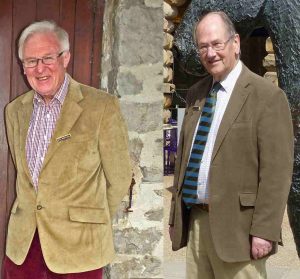
John Robinson and Jonathan Wicksteed
16th June 2020
One of the few positive consequences of the Covid-19 pandemic has been the British public’s gratitude for, and admiration of, the efforts and dedication of NHS staff and other, often poorly paid, workers in essential services during this crisis. As a result, there have been widely supported calls in the media and elsewhere for members of this group of people to be officially recognised. In Britain, this can probably best be achieved by way of the honours system. It was therefore timely that this talk was given (by means of video conferencing) by Club member, Christopher Jewitt who, in his role as one of the Deputy Lieutenants for South Yorkshire, is well acquainted with the processes by which honours are awarded.
As he explained, the honours system recognises people who have made achievements in public life or committed themselves to serving and helping Britain. They are given to those involved in all aspects of endeavour, for example community, voluntary and local services, the arts and media, health, sport, education, science and technology, business, and civil and political service. Christopher described the various types and levels of award, and the processes by which the honours lists are drawn up. There are two lists per year, one at New Year and the other for the Queen’s Official Birthday in June. Each list has several elements comprising those prepared by the Prime Minister, the Defence and Foreign Secretaries (in conjunction with certain foreign governments), and the Royal Victorian Order to which admission is solely at the Monarch’s discretion.
The speaker then described how the Lord-Lieutenants and County Lieutenancies encourage nominations and give advice to members of the public who wish to nominate individuals for awards and, if required, will comment on nominations when they are passed to the Cabinet Office for consideration. He concluded by answering the many questions raised by his audience.
2nd June 2020
At a time when British universities are facing unprecedented difficulties due to the effects of the coronavirus outbreak, this talk by one of our newer members, Tony Crook, was particularly topical. As a former pro vice-chancellor of Sheffield University, Tony was therefore eminently qualified to speak with knowledge and authority on this subject.
He started his presentation (arranged through the medium of video conferencing) by giving a background to the development of the British university system. He described how, originally, they were highly elitist with a core based on Oxford and Cambridge, later joined by the so-called ‘red brick’ universities established in the major provincial cities during the 19th and early 20th centuries. In the early 1960s there were 24 universities catering for 160,000 students which meant that only 4% of 18 year-olds received this level of further education.
There then followed a massive expansion in the numbers of both universities and students, with the former polytechnics being enhanced to university status and the construction of many new ones. Currently, there are 163 universities with approximately 2½ million students studying in those universities or other colleges offering degree level courses. Associated with these increases has come a fundamentally different way of funding them. Formerly, it was the taxpayer who supported the system but latterly the universities have had to rely on income from students’ fees, research grants from bodies other than research councils, and other commercial sources.
As the speaker pointed out, herein lies a serious problem for them. With the potential loss of income from overseas students and the general downturn in economic activity resulting from the Covid-19 pandemic, but with costs continuing to be incurred, many universities are building up enormous financial problems. To tackle these difficulties, they will have to change their methods of working. These will include on-line learning and the introduction of a greater number of part-time courses. Run in conjunction with strategies to enhance the status of degree apprenticeship schemes, these changes could provide new routes to learning lifetime skills for young adults, many of whom currently gain little benefit (and much financial burden) from the existing system, especially given the inadequate funding of further education and the lack of much needed higher technical and craft skills training.
Unsurprisingly in view of the large number of former academics in the audience, the meeting continued with a lengthy question and answer session.
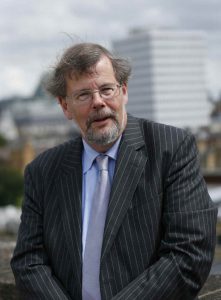
Tony Crook
19th May 2020
For our second meeting to be conducted through the medium of video conferencing, a total of 37 members participated in what is rapidly becoming a most satisfactory way of overcoming the restrictions on person-to-person contact during the current outbreak of Covid-19. Another factor giving rise to the high attendance figure on this occasion was no doubt attributable to the popularity of the speaker, Club member Peter Stubbs.
For this, his latest offering to the Club, Peter chose as the title of his talk ‘Getting away from the Shadow of Milton’, and this is very much what he did. In contrast to John Milton’s most famous epic poem, ‘Paradise Lost’, with its lengthy descriptions of such weighty matters as the expulsion of Satan from Heaven, and the Fall of Man, the speaker entertained his audience with readings from far more light-hearted and concise sources.
Starting with that most prolific of ‘authors’, “Anon”, Peter’s choice of poets ranged from Charles Cotton (writing in the 17th century), through W. M. Thackeray (in the 19th century), to more recent writers such as John Betjeman, Philip Larkin, Roal Dahl and Roger McGough.
Similarly wide-ranging in subject matter as in his choice of poets, Peter recited examples of poems about, amongst other things, tobacco, drugs, gluttony, death and sex. In fact, as it transpired, the topics covered many of the weaknesses to which mankind is prey and hence, were not altogether unrelated to matters considered by Milton in his poems.
In response to requests from members of his audience, the following is a list of Peter’s choice of poems: ‘The Pig’ (Anon), ‘The Pig’ and ‘A Hand in the Bird’ (Roal Dahl), ‘Tobacco’ (Charles Cotton), ‘Damages Two Hundred Pounds’ (William Thackeray), ‘Let Me Die a Young Man’s Death’ and ‘One After The Other’ (Roger McGough), ‘Coffee in Heaven’ (John Agard), ‘In Praise of Cocoa, Cupid’s Nightcap’ (Stanley Sharpless), ‘Oh What a Pity’ (Leslie Loader), ‘Annus Mirabilis’ and ‘High Windows’ (Philip Larkin), and ‘Senex’, ‘A Subaltern’s Love Song’ and ‘The Olympic Girl’ (John Betjeman).
5th May 2020
Determined not to be beaten by Covid-19, we have started to use online video conferencing software, Zoom, as a means of resuming our meetings. Today’s was the first of these ‘virtual’ meetings and was in the form of two presentations given by Club members Stephen Marsh and Ian Johnston.
In the first of these talks, Stephen described the pandemic known as Spanish flu which broke out at the end of World War I in 1918 and continued in waves until the following year. Despite its name (which referred not to the source of the disease, but to the neutral country whose uncensored press was free to report on it), its origins remain unknown. One hypothesis is that it started as a fairly mild outbreak in the United States – this was the first wave. Then, with the deployment of American troops to the battlefields of the Western Front a second, and far more deadly wave of infection, was released. This raged throughout the autumn of 1918, spreading from Europe to North Africa, India, China and eventually, Australia. It was followed in 1919 by a third wave of somewhat lesser intensity. It is estimated that, throughout the world 500 million people were infected by the disease, with between 50 and 100 million killed by it. Of these, approximately 75% died in a fourteen-week period between September and December 1918. Various approaches were taken to control the spread of infection including, as with the current Covid-19 outbreak, home isolation and the closure of public places and businesses.
The second speaker, Ian Johnston, turning to the current Covid-19 pandemic, examined the political decisions that will have to be made and the economic measures that will be required in order to tackle its profound effects. He expressed the view that the British economy could be devastated, but in any event will take decades to recover. As for the political decisions already taken, the British government is to be credited with its whole-hearted support of the NHS but, in the early stages of the outbreak, it was probably too hesitant in enforcing the lockdown. At the time of this meeting, the government is facing many more difficult decisions and Ian urged his audience to recognize that the politicians were doing their best in unprecedented circumstances. His final exhortation was for people to obey the rules set down by the government and its advisers.
3rd March 2020
Throughout history, mankind has looked enviously at birds and dreamed of being able to fly, but it was not until a little over a hundred years ago that this dream became a reality. Manned flight was the subject of this talk given by Club member John Thurstan who, in his retirement, finally achieved his boyhood ambition by learning to fly, and now has his own microlight plane.
With the aid of video clips, giving his pilot’s-eye view, he described one of his flights which took him to visit the Shuttleworth Collection in Bedfordshire. This is a working museum of vintage aircraft, veteran vehicles and other items of industrial heritage, and was opened to the public in 1963 to display the collection of items acquired by Richard Shuttleworth. Born in 1909, Shuttleworth developed a fascination for aviation and motor racing. At the age of 23, an inheritance provided him with sufficient funds for him to start his collection, to which many additions have been made since his death in 1940.
During his visit to the Collection, John examined and photographed many of the exhibits, some of which were actual or replica planes dating from the earliest days of flying. Comparing some of these with his own aircraft he realised that, although aircraft now in commercial or military use are significantly more complex and advanced than their predecessors, the type of plane – a flex-wing microlight – flown by him is remarkably similar, in its simplicity, to those in use a hundred years ago. It seemed to him that, as far as this branch of aviation is concerned, things have come full circle.
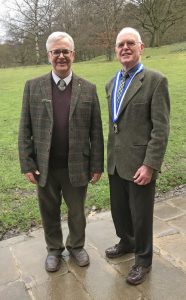
John Thurstan and Tony Byrne
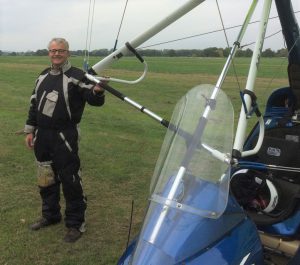
John Thurstan with his Microlight Aircraft
18th February 2020
To an outside observer, the pomp and pageantry associated with the function of the Lord Mayor of London appears to be a typically British anachronism in the 21st century but, as today’s guest speaker, Graham Westwell, explained, there is a vitally important and serious aspect to the Lord Mayor’s role, which must not be confused with that of the directly elected political executive of the Greater London Authority, the Mayor of London.
The history of the Lord Mayor reaches back as far as 1189, but it was not until 1354 that the title ‘Lord Mayor’ was first bestowed by the monarch. Although in the early days, the Lord Mayor sometimes served for a number of years, his (or her) term of office is now for a single year of intensive activity as a representative of not only the ‘Square Mile’ of the City but also the country as a whole. His/her primary duty is as Head of the City of London Corporation, but there are many other roles in connection with the life and functioning of the City.
Graham described the process by which the Lord Mayor, together with the two Sheriffs of the City of London, is elected. This is by members of the Livery Companies whose origins lie with the ancient trade associations and guilds, but whose interests now extend to professional and similar bodies. In order to be considered for election as Lord Mayor, the candidate has to be involved in at least three of these Livery Companies, to be well known in the City, and to be an Alderman of one of the 25 Electoral Wards.
Although a highly prestigious position, it is also an exhausting one because the Lord Mayor faces a year of hundreds of engagements, including many abroad, and plays host to visiting Heads of State at banquets at the Guildhall and Mansion House. This is not a role for the faint-hearted!
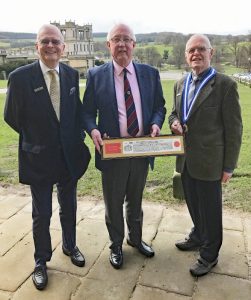
Malcolm Cameron, Graham Westwell (holding his Freedom Certificate of the City of London), and Tony Byrne
4th February 2020
Introduced by Club member, Ken Watson, the speaker today was Melanie Gilbert, who has been the Musical Director of the Matlock Gilbert and Sullivan Society since 1992.
Declaring herself to be a lifelong enthusiast for the collaborative works of William S. Gilbert, as librettist, and Arthur Sullivan, as composer, Melanie gave examples from several of their operettas to demonstrate their skill and talent. Although their musical association started as early as 1871, it was not until seven years later that their first truly successful comic opera, HMS Pinafore, was staged. Thereafter, a series of such operettas followed at fairly regular intervals over the next two decades. During this time, their works were produced by Richard D’Oyly Carte in the Savoy Theatre, from which they came to be known as the Savoy Operas. Indeed, the D’Oyly Carte Opera Company continued to perform and promote Gilbert and Sullivan’s works for over a century.
As the speaker pointed out, the partnership between Gilbert and Sullivan was not always particularly harmonious. Gilbert tended to be confrontational and his libretti were often disconcerting to Sullivan who, as a serious composer, wanted his musical accompaniment to be artistically satisfying. However, in spite of these differences between the two men, they continued to write and compose works that have stood the test of time and, well after a hundred years since their first performances, remain popular and, in many cases, remarkably topical.
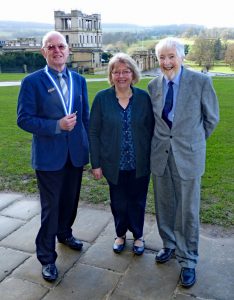
Tony Byrne, Melanie Gilbert and Ken Watson
21st January 2020
Talks given to the Club are often highly topical, and none more so than that presented today by one of our members, Roger Truscott. Asking, ‘If the scientists are right about the climate and ecology crisis, how will our lives need to change?’ he examined possible answers to his own question.
He first outlined the nature of the problem, and how we have arrived at this critical point in the Earth’s history. There is evidence from the geological record and other scientific studies that the Earth’s climate has always fluctuated – but the rate of change has accelerated since the Industrial Revolution. Levels of carbon dioxide in the atmosphere were first monitored in the mid-19th century. Now, thanks to the burning of fossil fuels, the destruction of forest cover, draining of wetlands, intensive farming and other human activities, concentrations are approaching a level not seen for millions of years. Although representing an extremely small proportion of the atmosphere, carbon dioxide, in conjunction with other gases, traps solar energy and creates the ‘greenhouse effect’. Temperatures are rising, weather patterns are changing, and extreme weather events are proliferating.
An associated issue is the explosion in the planet’s human population (from approximately 250 million in Roman times, to over seven billion now). Human activity has destroyed, and continues to destroy, many organisms regarded as competition, or which could not adapt to the changed environment.
Addressing the second part of his question (how our lives will need to change), Roger stressed that we must stop burning fossil fuels, plant many more trees, reinstate wetlands and flood plains and consume less of the Earth’s resources. As he said, “Now is payback time. The time of crisis has come”.
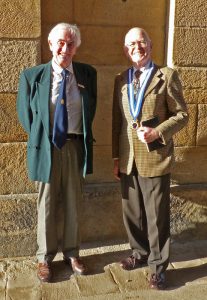
Roger Truscott and Tony Byrne
7th January 2020
With depths in excess of 4,000 metres into rocks whose temperature can exceed 55degC, the gold mines in South Africa are challenging and potentially very dangerous places to work, as described by the speaker, club member Richard Chaplin, at our first meeting of 2020. Richard had been Professor of Engineering Sciences at Reading University where, calling on his expertise in rope mechanics, he had been able to apply his experiences and knowledge gained as a consultant and researcher, to some of the problems facing this industry.
Gold mining in South Africa started in the late-19th century, at which time the mines were relatively shallow but, as they developed, their depths progressed to the point at which they reached a limit of approximately 4,000 metres. Accessing ore bodies beyond this depth became uneconomic or impractical because the weight of the ropes used in hoisting materials and personnel up and down the shafts became excessive and the time taken in lowering the workforce at the start of their shifts and the reverse at the end of their shifts seriously eroded into the time available for actual productive work. These factors contributed to additional costs and, hence, reduced profits in an industry which is always sensitive to the fluctuations in the world price of gold.
It was in response to the need for hoisting depths to be increased that the speaker and his team at Reading University collaborated with the South African research into the behaviour of the steel ropes used in these mines. They investigated the types of rope, their resistance to degradation and other physical properties. It was as a result of this work that, by developing new techniques, it became possible for the hoisting depths to be increased whilst maintaining, and even increasing, the levels of safety for the miners. As the speaker said, it was this latter point – safety – that has given him the most satisfaction from his work.
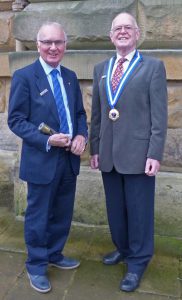
Richard Chaplin and Tony Byrne

© Bakewell and District Probus Club, 2014-2024